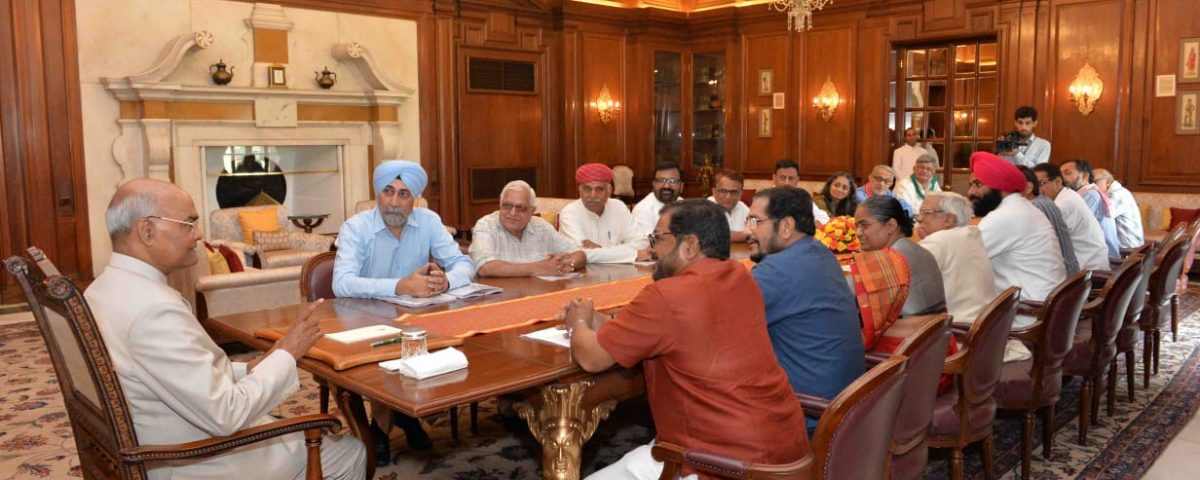AgriNation Network
New Delhi. 29 May 2018
Concerned over the growing number of suicides, farmers plight and agrarian crisis, members of All India Kisan Sangharsh Coordination Committee (AIKSCC) on Monday met the President of India and urged him to convene a Special Session of the Parliament to discuss the agrarian crisis in India in a threadbare manner, and to discuss the two Kisan Mukti Bills created by farmers of India and pass the same.
In their letter to President Kovind, AIKSCC said, ”What makes the situation extremely grave is that on one hand over 3.5 lac farmers have been compelled to commit suicides in the past about 15 years and on the other hand in the past 4 years of the present regime the suicide rate has increased by over 50% more than the previous years. The next generation is not interested in farming as it has become a losing proposition”
It further said, “as of date, 193 farming organizations have joined the AIKSCC to find ways and means to mitigate the hardships being faced by the farmers. After going through the length and breadth of the country, having covered over 10,000 km and having addressed and interacted in over 500 meetings, AIKSCC has narrowed down to two main demands to address the immediate crisis. Freedom from Debt and Guaranteed Remunerative Minimum Support Prices, the delegation further informed the president in their letter”.
In the meeting with President, V M Singh, the Convenor of AIKSCC appraised the President about AIKSCC, the Kisan Mukti Yatras undertaken all over India, the Kisan Mukti Sansad in November 2017 on Parliament Street, and the elaborate democratic processes adopted so far around two Kisan Mukti Bills created and submitted as Private Members’ Bill by Shri Raju Shetti (Lok Sabha MP) and Shri K K Ragesh (Rajya Sabha MP).
One Bill called the “Farmers Right to Freedom from Indebtedness Bill 2018” seeks an immediate one time loan waiver, including private loans and loans of landless farmers/ agricultural labour, in addition to bringing about systemic reforms of including all real farmers into institutional credit fold, to provide disaster relief from loans in case of natural disasters and to set up state level and national institutional mechanisms that would take care of farmers’ indebtedness on an ongoing basis. The Bill also seeks to reduce the possibility of indebtedness building up, by regulating cost of inputs, and promoting low cost farming.
A related Bill called “The Farmers Right to Guaranteed Remunerative Minimum Support Prices for Agricultural Commodities Bill 2018” covers the need to improve and set up accurate and comprehensive cost of production estimations, of regulating and reducing cost of inputs, of notifying remunerative prices with a profit margin of at least 50% over cost of production, and of setting up accountable mechanisms that will actualize such prices for all farmers in reality.
Information was also shared about the support extended by 21 political parties in March 2018, and the subsequent process of fine tuning the Bills along with senior political party leaders in April 2018. These political parties signed on a formal resolution adopted by them in a Round Table in Constitution Club, in March 2018 and included NDA allies like Shiv Sena.
It is noteworthy to recall that during Shri Atal Bihari Vajpayee’s tenure, a special session of Parliament was called, to discuss the crisis of sugarcane farmers, after the death of 3 farmers. Given the acute crisis of farmers in India today, it is important that such a session be convened again, to put into place statutory institutional solutions in place, AIKSCC stressed. “If a special midnight session can be organized for GST, why not a session to address agrarian crisis in India?”, asked AIKSCC.
The President expressed his view that the two demands (guaranteed remunerative prices and freedom from indebtedness) are indeed very important, expressed his support to the effort and stressed on the need to work hard to secure these rights.




